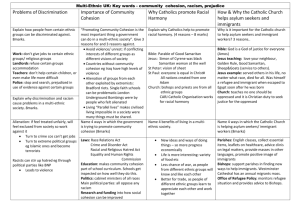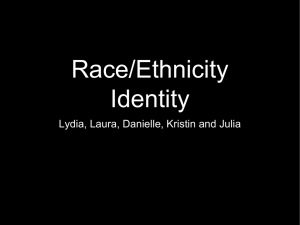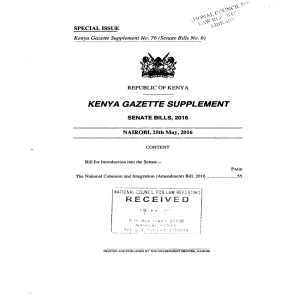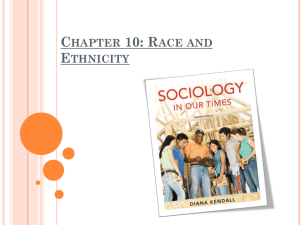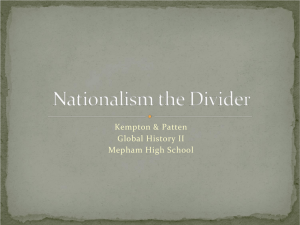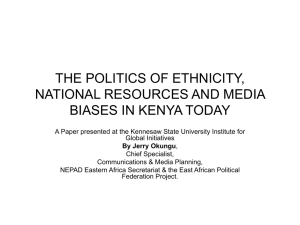The People`s Conference. - National Cohesion and Integration
advertisement
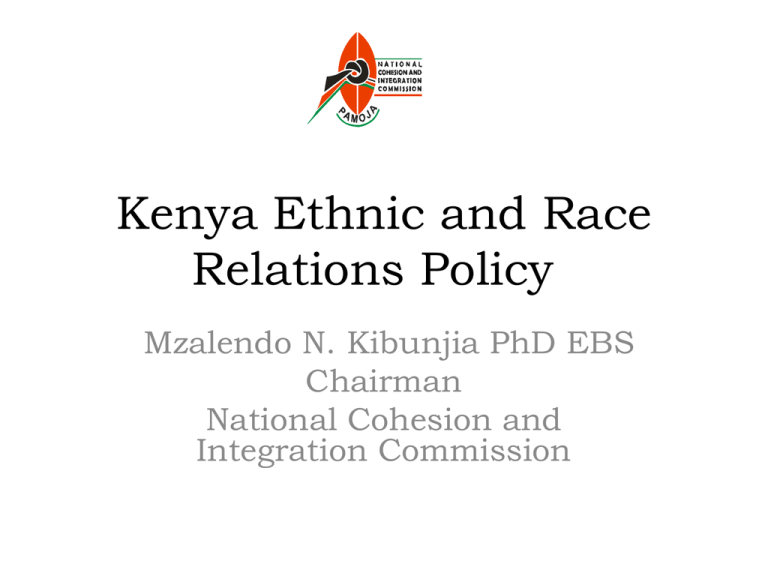
Kenya Ethnic and Race Relations Policy Mzalendo N. Kibunjia PhD EBS Chairman National Cohesion and Integration Commission Introduction • The object and purpose for which the Commission is established is to facilitate and promote equality of opportunity, good relations, harmony and peaceful coexistence between persons of the different ethnic and racial communities of Kenya, and to advise the Government on all aspects thereof. •In line with mandate, the Commission held 10 regional diversity conversations on ethnicity and race over the past 6 months in an effort to open up spaces for intercommunity dialogue to enable the identifying of opportunities through which ethnic, racial and religious tolerance could be enhanced and entrenched in a sustainable manner. •Forums were held in Nairobi, Kakamega, Kisumu, Njoro, Nyeri, Isiolo, Mombasa, Machakos, Lodwar and Garissa. The forums brought together key stakeholders from each of the regions. •Dialogues were designed to generate knowledge that would inform and influence research based advocacy on ethnicity and generate ideas that would inform an Ethnic and Race Relations Policy. •Prior to this document, Kenya did not have an Ethnic and Race relations policy. Vision of the policy A society which is socially cohesive, politically stable, and economically prosperous in which ethnic, racial and religious diversity are understood, valued, respected and supported Mission of the Policy To provide guidelines for ethnic and racial inclusion, the development of a national Kenyan identity, and to ensure equal protection, equality of opportunity, fair distribution of resources, equal access to services through legislation, participation, capacity development, civic engagement and dialogue among all ethnic groups and races towards a shared future for all Kenyans Sources of the Policy • The policy is based on: • • • • • the Constitution of Kenya National Cohesion and Integration Act Kenya Vision 2030 Statutory Law International Law as required by Article 2 of the Constitution of Kenya Implementation of the Policy • The policy requires that the national Government, the county governments, the private sector, civil society, communities, and individuals adhere to the constitutional demands for ethnic and racial inclusion. Will also require that county governments and various public and private institutions and companies develop their own ethnic and race relations policies that are specific to each entity but based on this policy. • Proper implementation of this policy will assist Kenya in entrenching its new Constitution, proactively mitigating conflict, building peace and ensuring cohesion. • The monitoring and evaluation functions of NCIC will include assessing the extents of proper implementation of this policy as called for by various policy statements in this document. • Consists of sixty eight policy statements that provide strategic guidance for achieving the policy vision of positive ethnic and race relations that will enable Kenya to become more socially cohesive, politically stable, and economically prosperous. •Processes which have led to communities being increasingly fractured and polarised are complex. Reversing them will require courage in tackling the difficult and controversial issues of social identity and values on which cohesion and integration depend. •NCIC cannot impose community cohesion, instead we work to enable and support community initiatives for improved national cohesion and integration and this was what informed the regional diversity conversations and hence the Ethnic and Race Relations Policy. •The policy then can only succeed in making a difference in ethnic and racial relations if Kenyans are fully engaged and take the responsibility of civil renewal. •We will give Kenyans through this conference a chance to validate the policy and give us feedback which will inform the policy.
